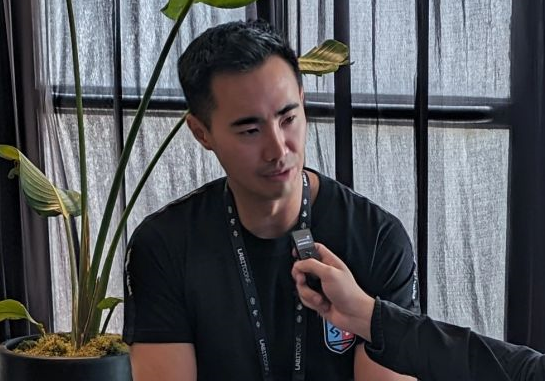“We are very excited about what is coming in 2025,” says Min Lin.
Now we are seeing enormous institutional adoption, says the specialist.
Within the framework of the most recent edition of LABITCONF, held in Buenos Aires at the beginning of November 2024, CriptoNoticias spoke with Min Lin, Chief Business Officer of the bitcoin (BTC) and cryptocurrency exchange, Bitget.
Min Lin, with a solid background in the traditional financial sector, addressed key topics in the talk such as the growth of the cryptocurrency industry in Latin America, the opportunities presented by the Argentine market and the importance of good regulation to promote innovation.
With an ambitious goal of attracting 100 million people to the cryptocurrency ecosystem, the manager also detailed the tools that Bitget offers both for new users and experienced traders.
In addition, he reflected on the necessary balance between centralization and decentralization, and the strategies that the company is developing to drive mass adoption in an environment that continues to evolve.
This interview offers us a look at the future of the cryptocurrency industry and the role that exchanges seek to play.
You have spent several years in the traditional banking system, more precisely at Goldman Sachs, how was the transition to the cryptocurrency industry? What similarities and what differences did you find?
Yes. I just logged into Bitget as Chief Business Officerthe business director. I have been in this industry for three years now. Before joining the world of cryptocurrencies, I was in investment banking at Goldman Sachs, based in Hong Kong for six years. And now we are looking at how we can boost the growth of the cryptocurrency industry here in Latin America, especially focused on Argentina as well.
The transition from Goldman Sachs was very interesting for me, because Goldman is a company that, when I was there, had been in existence for 151 years. So, they had all the processes well implemented. And the crypto industry in 2021 was still new, having existed for 10 years. On the other hand, it is now a highly developed industry.
So it is very interesting to see the innovations that the cryptocurrency industry brings, such as how they make settlementsthe topic of decentralization, blockchain, distributed ledger technology (distributed ledger technology). It is very interesting to see how that is evolving the financial transactions of the future. That is why I am very interested and joined this industry.
There are several on-chain metrics that show that there is currently little retail participation in bitcoin and cryptocurrencies. Are you seeing that at Bitget? What expectations do you have for the future? Will the retail investor return?
Yes, platforms like us at Bitget are more focused on what the retail. That’s why we have the product of copy trading. We have one of the largest copy trading platforms in the world, with 800,000 copy traders and 180,000 elite traders. This means that we are teaching people trading strategies, especially those who do not understand how to trade on their own. So, copy trading is a product that makes it easier for them to understand how trading works.
Within the cryptocurrency ecosystem, do people prefer decentralized or the convenience that centralized provides?
We exchanges are between CeFi and DeFi. So, people who join the world of cryptocurrencies normally transact first through a centralized exchange and then, little by little, when they have much more experience, they go to the DeFi space.
We are now seeing quite a bit of growth in DeFi. That is why we have launched and invested in Bitget Wallet, which is one of the most downloaded wallets in the world. I think we have already surpassed downloads by MetaMask. We are seeing that the market is growing a lot in the DeFi issue.
Are you aware of the economic and regulatory changes in Argentina? How do they impact the industry?
Argentina is developing a lot in the regulatory field. We have seen that they are doing a lot of consultation with the industry to see how to continue developing the regulations here.
That is very important, because having the conversation with market participants helps us see how to grow the industry. When I worked at Binance, we talked a lot with regulators to see how to drive that growth.
Something we saw is that they do not want to over-regulate the industry. This is important because in some cases, where they regulate through enforcementthat is not good for the industry as it limits growth and innovation.
It is best to take a principles-based approach, because that allows the industry to grow. The big question is: How to regulate an industry that is always growing, always changing and decentralized? It’s very difficult.
How do you find the balance between regulation and freedom?
To make way for innovation and growth in an industry as new as cryptocurrencies, it is necessary to opt for principle-based regulations. This allows companies to continue growing and developing innovative products. If we adopt a more restrictive approach based on limiting risks, it will be difficult for the industry to continue growing because companies’ abilities to innovate are limited.
It is a new industry, but not that new either. Bitcoin is now 16 years old. What predictions do you have for the coming years?
We are expecting the industry to continue growing a lot. If you look at the growth and investment in bitcoin ETFs, lately, in the last 14 days, billions of dollars have been invested. So, we are seeing that the adoption of cryptocurrencies is moving towards the institutional, and that gives a lot more confidence to the market and a lot more stability. We are very excited for what is coming in 2025 and in future years because we see continued growth.
And what plans do Bitget have to face this coming situation?
We have been in the market for six years and we are the platform for copy trading largest in the world, within the cryptocurrency niche. Our plan is to create more products and services for customers in Latin America and other parts of the world. For example, we launched Bitget Pay, a product that facilitates direct transfers and payments. This helps bring new people into the ecosystem.
Additionally, Bitget has a user protection fund of over $400 million, which is the second largest in the industry. This is key to building trust, because it means that users’ assets are protected.
What does that protection fund mean?
It is similar to Binance’s SAFU. What we do is look at industry players with best practices. This fund protects users against hacks and attacks on the platform. Fortunately, at Bitget we have not had any hacks or losses of user assets. But if something were to happen, the fund would cover those costs.
Considering that the industry is becoming more competitive with more exchanges, how does Bitget position itself where it wants to be?
It is important to differentiate ourselves through the products and services we offer. We are very focused on launching products like Bitget Pay, understanding what the local market needs to continue growing. Bitget is highly aligned with retail customers and our goal is to attract over 100 million people to the cryptocurrency ecosystem. That’s why we are constantly developing products that meet those needs.






Leave a Reply